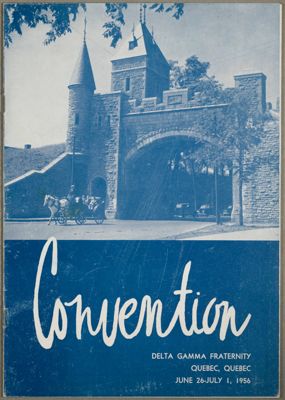
Beta Xi
Michigan State University
- Founding Date
- Jan 5th, 1946
The history of Michigan State University dates back to 1855, when the Michigan Legislature established the Agricultural College of the State of Michigan in East Lansing, with 3 buildings, 5 faculty members and 63 male students. As the first agricultural college in the United States, the school served as a prototype for future land-grant institutions under the Morrill Act enacted during Abraham Lincoln's presidency. The school's first class graduated in 1861 right after the onset of the American Civil War. That same year, the Michigan Legislature approved a plan to allow the school to adopt a four-year curriculum and grant degrees comparable to those of the University of Michigan. In 1870, the College became co-educational and expanded its curriculum beyond agriculture into a broad array of coursework commencing with home economics for women students. After World War II, the college gained admission to the Big Ten Conference, joining the rival University of Michigan, and grew to become one of the largest educational institutions in the United States with over 50,000 students as of 2014. In its centennial year of 1955, the state officially made the school a university and the current name was adopted in 1964 after Michigan voters adopted a new constitution. A local group from the college petitioned Delta Gamma in 1925. National officers investigated this group, but felt it wasn’t the right time for expansion to this college. In 1932 Delta Gamma received a petition from another local sorority. Lansing and Grand Rapids alumnae supported this effort, and were encouraged by national officers. The alumnae were “heart-broken” when the plan fell through following a vote of the Fraternity. In 1945, Delta Gamma learned that due to increased enrollment Michigan State College was to open its doors to two more national sororities. This was the right time for a new Delta Gamma chapter. The total enrollment in 1945 was 3800, 2800 of which being women, as the United States was at war. The local alumnae used college files, recommendations from various sources, and campus honorary group membership lists to identify potential members for the new chapter. Sixty-five women were interviewed by Marcia Strickland, Xi-Michigan, Province Secretary. It was the goal of Mrs. Strickland to pledge quality instead of quantity. Eighteen women were pledged to the colony on June 8, 1945, in a ceremony conducted by 20 members from the Ann Arbor chapter and one from Albion chapter (which was not in session) in the home of Kittie Walker Knapp-Xi, Michigan. “The committee on arrangements did splendid work on the tea, particularly considering the food shortages. They even decorated the individual pieces of cake with Greek letters.” The next project was for the alumnae to find a house for the future chapter. East Lansing was notorious for being difficult for the house hunter, but one was found at 327 Hillcrest Street. When the pledges came back for fall term, they found the kitchen and upstairs bedrooms ready, but in the living room was a bathtub and in the beau parlor was a toilet seat. Making the best of the situation, the girls moved in and held informal rush with a ship-wreck party theme. The new Delta Gammas won the gold Panhellenic cup for first in scholarship that fall term. The initiation ceremony on January 5, 1946 was conducted by national officers in the Peoples Church in East Lansing. Delta Gammas from Ann Arbor and Albion were present for the ceremony and installation banquet. The price of the banquet was $2. A large reception followed the next day. Beta Xi instigated and organized the first State Day for Michigan Delta Gammas in 1950. Beta Xi had several early traditions. Steak and mush dinners were held to promote high scholarship. All who raised their grade point average and had over a B average ate steak. The others ate on newspapers on the floor. The most outstanding pledge was awarded a square silver crested ring. A gold crested ring was presented by the Lansing alumnae to the senior most outstanding in scholarship, character, and activities. The president’s pin belonged to a charter member of Xi chapter. An impressive candle lighting procession was held for seniors. Members gathered in front of each senior’s room and sang favorite songs as the seniors made their way downstairs for a farewell “spread.” The chapter held three annual parties, a Halloween hayride, a formal dinner dance named the Golden Anchor Ball, and a picnic called Delta Gamma Field Day in the spring. In the summer 1975 ANCHORA, is an article titled “Beta Xi’s miracle.” It tells the story of the re-colonization effort of Beta Xi chapter in 1974. In the fall of 1973, after graduating 25 seniors, the chapter was left with four members. Several fraternities and sororities on campus had been forced to close because they could no longer fill their houses. The hard work and faith of these four members, two Delta Gamma transfers, Lansing alumnae, Fraternity representatives, and Xi and Zeta collegians, made the re-colonization a huge success. Bonnie Lauer, alumna professional golfer, was named Rookie of the Year in 1977. Another alumna Susan Spencer, a CBS News Correspondent in 1977, won two Emmy Awards for her “48 Hours” stories. In 1994, Beta Xi made a significant contribution to The Delta Gamma Foundation in memory of member Stephanie Ellis. The Stephanie Hope Ellis Memorial Scholarship has been awarded to a Beta Xi member fifteen times since first awarded in 1995. The chapter publishes “The Hannah Herald” for its members and friends. In 2013, Beta Xi was recognized as Chapter of the Year out of the 14 Panhellenic chapters on campus. In addition, Beta Xi won the Internal Relations and Philanthropy and Service Awards, and Mary Pickens, chapter president, was recognized as Chapter President of the Year.
Chapter Information
01/05/1946












